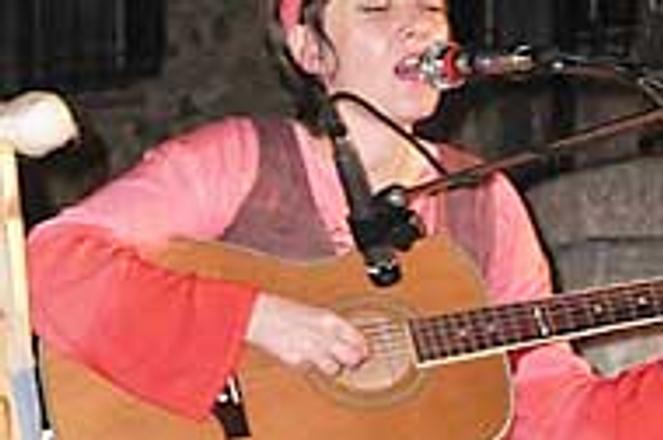SUÍ Vesan's creative process has no boundaries.photo: Eva Mišovičová
SHE HAS a name that is not easy to remember and a voice that is difficult to forget. Suí Vesan's artistic first name is an abbreviation of the phrase 'Som u teba ihneď' or 'I'll be right with you'. It reflects Vesan's wish that her music will always be a comfort to her listeners. Her surname is an allusion to the number 120 in Italian. That is how many songs she would like to have credited to her name.
A relative newcomer to the Slovak world-music scene, 36-year-old Vesan has made a name for herself by performing original works. Starting out as a guitar-playing folk singer, she soon stood out among her fellow musicians. It was not only her unconventional voice but also her lyrics that caught the audience's attention.
She has a great range and sings her songs in Slovak and the invented language 'Tatlanina', which to some seems like an exotic language, to others like baby talk. The sounds are freely improvised during concerts, and sometimes resemble the jazz vocal technique called scat. But what seems to the listener to be a random assemblage of syllables has a deep significance for Vesan.
"The way I sing has to do with vibration, because certain consonants have a specific meaning. The keys the songs are sung in are important too," she explains.
In concerts, Vesan sings her songs differently to how she performs them on her first, and so far only, CD entitled simply Suí. Her manner of performance seems to depend on her mood, and what kind of story she wants to tell with her music. It is a freedom she takes advantage of when performing live.
The success of Vesan's recordings broadcast on the BBC programme World of Music resulted in a recent invitation to perform live on the show. She also performed at the London jazz festival last year and has been the guest of many TV and radio shows in Slovakia.
Suí Vesan's album Suí is available at music shops across the country for about Sk300.photo: Spectator archive
According to Vesan, the ideas for her songs often originate in dreams. This gives her work a very personal, almost intimate feel. The sources for Vesan's inspiration are manifold, and each listener finds something different in her music.
"I've been inspired by the songs of the Native Americans, Indian literature, and as a child I spent some time in Syria and was very impressed by the chants of the muezzins. And I fell in love with the film Baraka, which tells a story with only music and pictures," she says.
The most surprising part of Vesan's performance, besides her unusual voice, are the different objects she uses as musical instruments. Usually playing the guitar and a small darbouka drum, she gives her music a special touch with different sounds from dried plants - like a poppy-seed pod, a thistle, or a fir cone - and different small boxes filled with spice, which has a sound reminiscent of a children's rattle. To imitate the sound of the Indian tabla drum, she plays the small drum not with her hands but with a big shell instead.
In a recent concert for a Slovak radio station, Vesan performed accompanied by drums and a fujara (a shepherd's long pipe, a Slovak folk instrument). However, she says, she does not have a permanent band because she is always looking for new impulses and can imagine being accompanied by any type of instrument.
The Indian trail in her music is the one she would like to pursue most. The singer plans a trip to India in order to learn how to play the sitar and the tabla and to add those skills to her "European rhythm".
"I like the composition of Indian music. After a musical piece is completed, it should leave you with a riddle, a question mark in your head, and not give you an answer.


